- Home
- Elmore Leonard
The Bounty Hunters Page 5
The Bounty Hunters Read online
Page 5
Lieutenant Duro then looked about the courtyard leisurely, from the riflemen to the Apache, then to the two Americans and the rest of his rurales in the narrow shade of the house. He ignored Hilario and his delegation of villagers. He was sick of their wide-eyed hesitancy, their halfhearted pleading on matters of no importance as they twisted the brims of their sombreros with nervous fingers. Hilario was different, he admitted to himself. But he was of the other extreme. Hilario had been with Juarez at Querétaro and had witnessed the execution of Maximilian and he retained strange ideas concerning rights. Hilario would have to be shown his place.
Santana stood before him now, idly slapping the quirt against the booted calf of his leg. Lieutenant Duro eyed the cigar in the sergeant’s mouth. He took a long, sucking draw on his own then dropped it to the ground. He looked directly at the sergeant, exhaling the smoke slowly.
The sound of the quirt slapping against leather stopped.
Santana returned the lieutenant’s stare, his cigar clenched in the corner of his mouth, but only for a moment. He dropped the cigar and ground it into the hard-packed sand.
Duro smiled faintly. “We are ready now?” he said.
Santana mumbled, “Ready,” and turned to go back to the firing squad.
“Sergeant!”
Santana turned slowly.
“Listen. Ask your marksmen to aim lower than the head.”
“Yes, Teniente.”
“And take his hair neatly when it is over.”
Santana nodded toward the two Americans who were watching with interest. “Perhaps one of those should do that.”
Duro smiled again. “You would debate the matter?”
“I was only talking.”
“Talk to your marksmen,” Lieutenant Duro said.
As Santana moved off, Hilario Esteban approached Duro.
“May I ask a question, Señor Duro?”
The lieutenant’s eyes followed Santana. “What is it?”
“I would ask by what right you kill this Apache boy.”
“You answer your own question. He is Apache.”
“He is a peaceful Apache. The American merchant told us that he is Aravaipa, which have seldom been at war, and when they were, it was long ago. Besides, he is only a boy.”
Duro looked at him with his faint smile. “Boys grow into men. Let’s call these bullets the ounces of prevention.”
“Señor Duro, this American will go back and tell his government…”
“What, that we have shot an Apache?”
Hilario shook his head and the lines of age in his face seemed more deeply etched. “Señor Duro, this one is at peace. He assists in the selling of the merchant’s wares and entertains no thoughts common to the Apache. The American will tell his government what we have done and there will be ill feeling.”
“Ill feeling! Old man, stop…”
“Señor, I am responsible for the welfare of travelers who visit Soyopa as well as our own people. I have a trust…”
“Do you really believe that?” Duro looked at the old man closely.
“With all certainty.”
“You believe your office to be one of honor, which involves the bearing of grave responsibilities?”
“Señor Duro.” Hilario’s tone lost respect. “We are discussing the life of a boy. One who has done nothing hostile to any of us!”
“You actually believe the alcalde resides in a seat of honor?” The lieutenant’s voice remained calm.
“Señor Duro…”
The lieutenant interrupted him. “Corporal!” And as the corporal hurried toward him, he said, “Since your office is of such magnitude, perhaps you should remain close to it. Sit at your desk, Alcalde, in your seat of honor, and contemplate your grave responsibilities.” And then to the corporal, “Take your men and escort our alcalde to his office…and Corporal…if he puts his head out of the door…shoot him.”
He waited until they had taken Hilario out of the courtyard—a rurale on each arm and others behind with their rifles at ready—the five of the peon delegation hurrying out ahead of them. Then he turned back to the firing squad. Santana was looking toward the gateway.
“Sergeant!” the lieutenant called, just loud enough to be heard. “If you please…” And he thought to himself: Lamas, you are an animal. But his mind shrugged it off, because it was a long way to Mexico City, and now he watched intently as the squad raised their rifles.
The two rurales moved away from the Apache boy. His eyes followed one of them as the dove-gray uniform moved off toward the house. The bullets go even all the way down the back! He heard a command in Spanish. One word. And there are so many of them; each man has two belts, and who knows, there might even be more stored in that great jacale. Another Spanish word broke the sudden stillness of the courtyard. Would it not be fine to have a belt with so many bullets. He heard the last command clearly…“Fire!”
Hilario Esteban, crossing the square, passing the slender obelisk of stone, heard the rifle fire. A short roll, a sharp, high-pitched echo that carried away to nothing. His shoulders hunched as if by reflex, then relaxed, and he sighed. A rifle barrel jabbed against his spine and only then did he realize that he had hesitated.
6
Lieutenant Duro strolled through the east gate and circled the two-story building which served as his headquarters. It had been someone’s home when he arrived in Soyopa, but he’d forgotten whose now. On the lower floor he kept supplies—equipment, ammunition, spare rifles, all those things needed by his rurales. At the front, a stairway at each end of the ramada climbed to the floor above. This he had chosen for his living quarters. The two rooms were drab—bare, colorless adobe and board flooring that squeaked with each step. The quarters reminded Duro of the cell of a penitent monk; but in Soyopa what could one expect.
Two of his men stood in the shade of the ramada, guarding the possessions of the frontier police. They nodded as he rounded the building and straightened slightly, though their backs remained comfortably against the wall.
Duro shook his head wearily. What excuse for men, he thought. For months he had drilled, cursed and punished them into being soldiers; but it had been to no avail and now Lieutenant Duro was past caring. What did it really matter?
Mexico City was in another world, a hazy world that was becoming increasingly more difficult to conjure in his mind. He would picture himself as he had been at the Academy—and the bailes and the young girls who could not keep their eyes from the uniforms. But that had been during the short presidency of Don Sebastian Lerdo de Tejada. A few years seemed so long ago.
It was said often that the son of Don Agostino Duro, who was a personal friend of Lerdo Tejada, would rise from the Cadet Corps like a comet to a glorious career in the Army. When he received his lieutenancy, at the head of his class, Lamas Duro appeared well on the way. Unfortunately, Porfirio Diaz’s political coup followed three months later.
Many of the Lerdistas disappeared, including Don Agostino Duro. His son, however, was a political enemy by blood, not by avocation; so Lamas disappeared merely from the capital. His military training was something which could be utilized in Porfirio Diaz’s new creation—the Rurales. The Frontier Police. And Soyopa was far enough from Mexico City to guard against Lamas Duro’s blood interfering with his politics.
He gazed about the square now, motionless in the sunlight. Wind-scarred adobe, squat dwellings, most of them without ramadas, old looking beyond their years. The church was directly across from his headquarters—it rose sand-colored, blending with the surrounding buildings which pushed close to it, a wide door, but a belfry that was too low for the width of the building and it only vaguely resembled a church. Santo Tomás de Aquín.
Past the empty fountain with its solitary stone obelisk, Duro could see down a side street to the house of Hilario Esteban, and the two rurales lounging in the doorway. God in Heaven, how can I be given such men! He turned disgustedly then and climbed the stairs to the upstairs veranda. Before
going inside, he looked out over the square again. But nothing had changed.
Curt Lazair remained in the lieutenant’s chair as Duro entered from the veranda. He lounged comfortably with a boot hooked on the desk corner next to his hat and he eyed Duro curiously. The rurale lieutenant had not seen him and was still deep in thought as he closed the door; and now Lazair smiled faintly.
“It’s a long way to Mexico City.”
Duro was startled. He turned from the door quickly and looked at the man with astonishment.
“Well, it’s no farther than Anton Chico, New Mexico,” Lazair went on. “Only Anton Chico ain’t a hell of a lot better than Soyopa. It’s all in how you look at things.”
Duro nodded. “Yes, it’s all in how you look at it.” His head indicated the outside. “And I cannot say that I see very much out there.”
Lazair smiled again—a smile which said he believed in little and trusted in even less. He shrugged now and said, “Money.”
There was little sense in talking about it. Duro had discovered that the least said to this man, the better. Nothing seemed important to him. And always he was relaxed, as if to catch you unaware and then make fun of something which should be spoken of with sincerity. He wants to make you mad, Duro thought. Tell him to go to hell. But instead, he said, quietly, “You need a shave.”
“I been out working for you.” Lazair passed the palm of his hand over dark, neatly combed hair. “But I slicked my hair down when I found out I had to visit the lieutenant,” he said mockingly. He was a man close to forty, almost handsome, crudely handsome, and the glistening hair contrasted oddly with the beard stubble on his face. He wore soft leather pants tucked into his boots; pistols on both sides of his low-slung cartridge belt, and he slipped one of the pair up and down in the holster idly as he spoke.
His other hand dropped from the arm of the chair now and he lifted a canvas bag and swung it onto the table.
“I brought you something.”
Duro made no move toward the desk, though his eyes fell on the bag. “How many women did you kill this time?”
The words had no visible effect on Lazair. “Count ’em and see.”
“I’ll take your word for the number. I trust though you’ve taken the ribbons from the hair,” Duro said.
Lazair nodded. “Sure we did. Just like you wiped that little boy’s nose before you shot him a while ago.”
“Were you there?”
“Two of my men were. I just come in.”
“You’re quickly informed.”
Lazair smiled. “You got to get up a hell of a lot earlier than you do.”
“How many did you take?” Duro said irritably. “I don’t have all day.”
“Open it up and find out.”
“I said I’d take your word!”
Lazair came off the chair then and pulled the sack toward him. As he untied the rawhide string he said, “You’re awful goddamn squeamish about something you’re making money out of.”
Duro said nothing as Lazair opened the bag and held it upside-down. The scalps came out of the bag as one—a hairy mass, glistening black and matted with dried blood. Duro frowned as Lazair ran his hand through the pile, separating the scalps.
He said, “When did you take them?”
Lazair glanced at him as he lined the scalps along the edge of the desk. “What difference does it make?”
“They smell.”
Lazair laughed out loud. “Man, these used to be the tops of heads. What do you expect!”
“Put them back. I said I’d take your word for the number!”
But Lazair would not be hurried. “Even salted ’em down.” He looked up at the lieutenant then and winked. “After I greased ’em good so they’d be sure and look Indian.”
Duro studied the bounty hunter silently. Within him he could feel the hatred for this man. It caused a heat over his face. But he was aware of his conscience ever more than the hate, and he said very simply, “You are the filthiest man I have known.”
“But you can’t get really mad, can you?” Lazair said. “Not without hurting yourself. Daylight’s a bad time of the day. It shows everything plain and if you happen to look in a mirror, you even see yourself.” Lazair smiled again. “But there’s always night…and your mescal bottle…. Just remember one thing, soldier boy, I don’t need you as bad as you think I do. If I can buy you, then there’s some other goddam broken-down soldier who’ll act just as dumb for money you don’t have to work for.”
“Maybe you had better look for this other ‘broken-down soldier’!” Duro flared.
Lazair shook his head, smilingly. “I don’t have to. I know you too well. You’re stuck here and you don’t have a choice. And every year you see government pesos coming in for the scalp bounties. Easy money to take, it looks like, only you have to balance what goes out with a scalp coming in. But when somebody comes along and offers you money in return for taking all scalps—no questions—then you’re just doing your job. All you got to do is add and subtract…and you know how to do that.”
Duro said, “Add scalps that are not always Apache.”
“It’s up to you.” Lazair shrugged. “If you want to quit vouching for ’em it’s up to you. Only I don’t think you can. You get back ten pesos for every hundred going out. That’s a lot of mescal when all you got to do is add up when the government man comes around. He isn’t going to feel ’em for texture. So don’t give me any goddamn talk about keeping your hands clean, because they’re just as dirty as mine. Maybe dirtier,” Lazair said evenly, “ ’cause I don’t particularly like Mexicans anyway.”
“Get out!” Duro screamed.
Lazair lifted his hat from the desk. “I wouldn’t want to be in your skin. You don’t know who to be mad at, do you?” He went to the door, then hesitated after he had opened it. “I know there’s eight hundred pesos’ worth there, so let’s not go juggling the books. We’ll settle after you’ve cooled off.”
Duro waited until he heard Lazair descending the stairs. He went to the desk quickly then and began sweeping the scalps into the sack that he held open below the desk edge. As he did this, he did not look down and he brushed his hand stiffly, with the fingers held tightly together so that he would not feel their texture. Yet a picture formed in his mind. A picture with the shock of a knife thrust to the stomach…even though it was only an almost indiscernible Mexican woman, no one he recognized, but with flowing black hair…
Hilario Esteban had moved the stool close to the window so that he could look out into the street. The street seemed so deserted this morning. At first he thought it strange, then one of the rurales appeared near the window and it was not strange. There was little for these frontier soldiers to do, most of them stationed far from their own villages, and often their minds would be suddenly activated by the sight of a villager passing along the street.
And as if they were a breed apart and all others were enemies, they would do unnatural things. Hilario had seen them shoot at the heels of old women to cause them to run. It was a sight to see an old woman running, then fall—they always fell—and scramble and roll in the dust shrieking. And they would think of other things to while away the hours. Sometimes they were as children. Like the morning Hilario had awakened to find the obscene word painted on the front of his house. Four red letters reaching higher than a man’s head. It had taken a full day’s labor to scrape the paint from the adobe, and they had stood around to laugh as the alcalde performed such work.
He leaned out of the window now and looked to the side. The two pairs of legs extended from his door stoop. The front of the brim of a sombrero showed also, but that was all he could see. Maybe they were asleep now, he thought. “God, make them sleep well and keep thoughts from their heads,” he whispered.
They would not let him approach the door and earlier they had threatened him with the butts of their rifles when he wanted to open it. The house was becoming an oven and it was not good to remain in it with the door closed. Th
ankfully, he had the window—not all houses had a window—but he was used to having the door open. Perhaps it is better that it does remain closed, he thought. Else they might be tempted to enter and take something. Something of Nita’s. Before, one of them had asked him where Nita was, then laughed and said something obscene. “God, why do you make such as these?” And then he thought: But if there were no evil men, then how could you tell the good? He pictured his wife then, for a reason he did not know, and he was glad that she was not here to witness his being degraded. Though she would understand. Maybe she sees anyway; but she is probably talking to the saints. He thought then of Francis of Assisi because he had been a very humble man, and he wondered what St. Francis would have done had he lived in Soyopa.
St. Francis would have pleaded for the life of the Apache boy. I know that, Hilario Esteban thought. But what can be done with a man like Lamas Duro, who is in such agony with his fate that he directs his anger to those beneath him?
In the beginning, Hilario had prayed for Duro’s soul. He had felt honest sorrow for him. Now his prayers were less frequent. It was easy to despise Duro, but hard not to be afraid of him. Still, he opposed Duro because his conscience directed him to. A man cannot disobey his conscience. Perhaps when Anastacio returns things will be better. It is very lonely here without Nita, he thought.
Across the narrow street, on the wall that joined Anastacio’s house, a faded poster advertised a bullfight in Hermosillo. Anastacio loved the Corrida, and had posted the sheet there more than a month ago. On their way to Willcox for a reunion, he had planned to stop in Hermosillo and take the entire family to the Corrida.
From the window, Hilario read the poster again. How many times have I read that? he thought. I can see it in my mind clearly. Even that which I cannot read now. The lower part is torn, but it said at one time: Sombra—3 pesos…Sol—1 peso. Boletos de venta en todas partes.
He wondered then if Anastacio had taken enough money. How much…three pesos times eighteen…so that the family could reach the Corrida from the shade. He went into the rear room then to lie down. There was nothing more to see on the street.

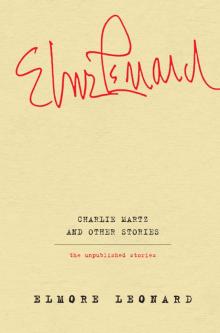 Charlie Martz and Other Stories: The Unpublished Stories
Charlie Martz and Other Stories: The Unpublished Stories Elmore Leonard's Western Roundup #2
Elmore Leonard's Western Roundup #2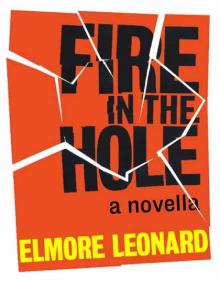 Fire in the Hole
Fire in the Hole Tishomingo Blues (2002)
Tishomingo Blues (2002)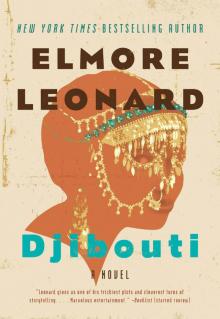 Djibouti
Djibouti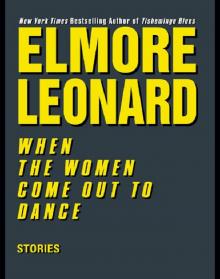 When the Women Come Out to Dance: Stories
When the Women Come Out to Dance: Stories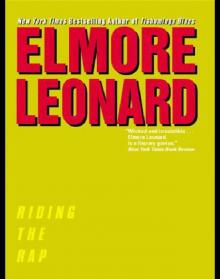 Riding the Rap
Riding the Rap Moment of Vengeance and Other Stories
Moment of Vengeance and Other Stories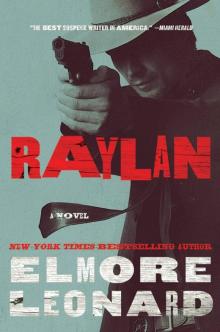 Raylan
Raylan Touch
Touch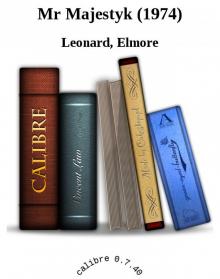 Mr Majestyk
Mr Majestyk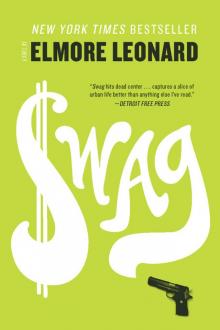 Swag
Swag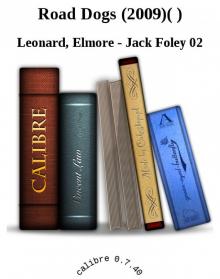 Road Dogs
Road Dogs La Brava
La Brava The Hot Kid
The Hot Kid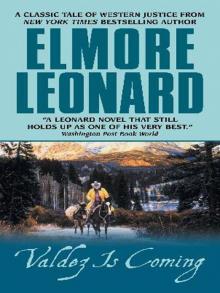 Valdez Is Coming: A Novel
Valdez Is Coming: A Novel Be Cool
Be Cool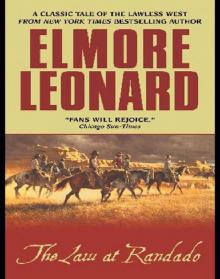 The Law at Randado
The Law at Randado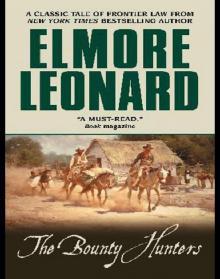 The Bounty Hunters
The Bounty Hunters When the Women Come Out to Dance
When the Women Come Out to Dance 310 to Yuma and Other Stories (1953)
310 to Yuma and Other Stories (1953)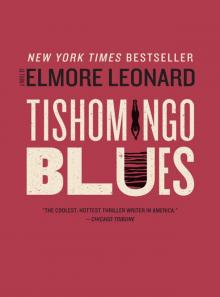 Tishomingo Blues
Tishomingo Blues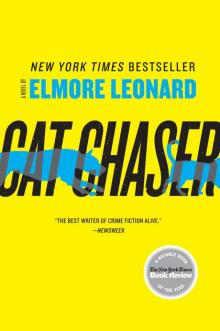 Cat Chaser
Cat Chaser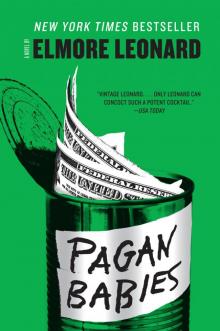 Pagan Babies
Pagan Babies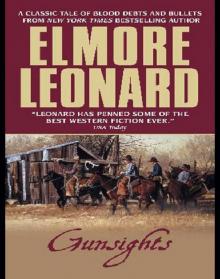 Elmore Leonard's Western Roundup #1
Elmore Leonard's Western Roundup #1 52 Pickup
52 Pickup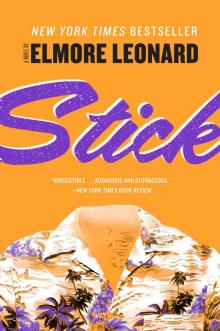 Stick
Stick The Moonshine War
The Moonshine War Valdez Is Coming
Valdez Is Coming City Primeval
City Primeval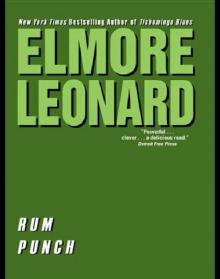 Rum Punch
Rum Punch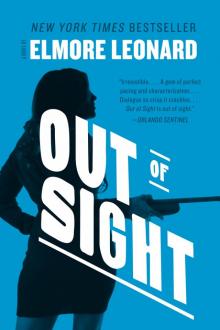 Out of Sight
Out of Sight Naked Came the Manatee (1996)
Naked Came the Manatee (1996)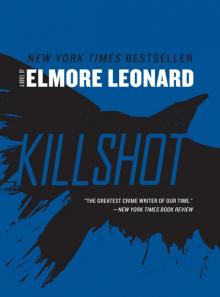 Killshot
Killshot Cuba Libre
Cuba Libre Forty Lashes Less One
Forty Lashes Less One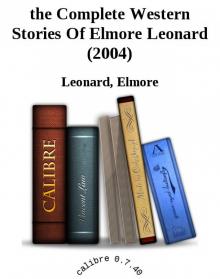 The Complete Western Stories of Elmore Leonard
The Complete Western Stories of Elmore Leonard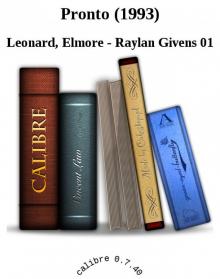 Pronto
Pronto Split Images
Split Images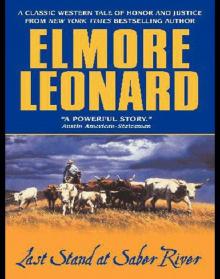 Last Stand at Saber River
Last Stand at Saber River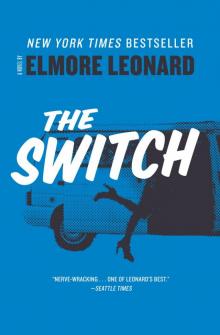 The Switch
The Switch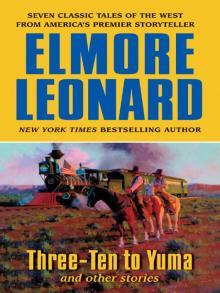 Three-Ten to Yuma and Other Stories
Three-Ten to Yuma and Other Stories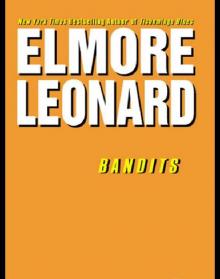 Bandits
Bandits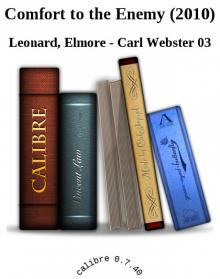 Comfort to the Enemy and Other Carl Webster Stories
Comfort to the Enemy and Other Carl Webster Stories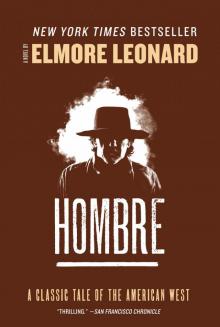 Hombre
Hombre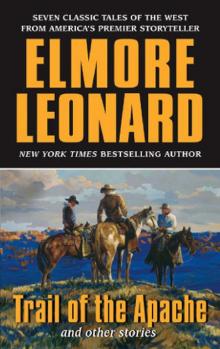 Trail of the Apache and Other Stories
Trail of the Apache and Other Stories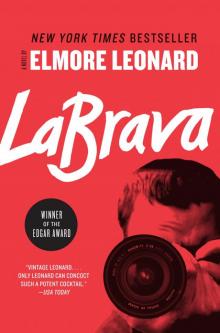 LaBrava
LaBrava Gold Coast
Gold Coast Jackie Brown
Jackie Brown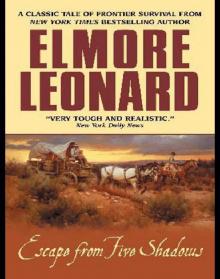 Escape From Five Shadows
Escape From Five Shadows Karen Makes out (1996)
Karen Makes out (1996)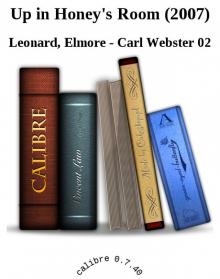 Up in Honey's Room
Up in Honey's Room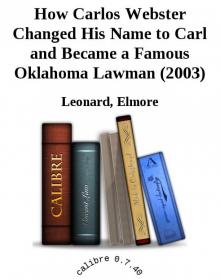 How Carlos Webster Changed His Name to Carl and Became a Famous Oklahoma Lawman (2003)
How Carlos Webster Changed His Name to Carl and Became a Famous Oklahoma Lawman (2003)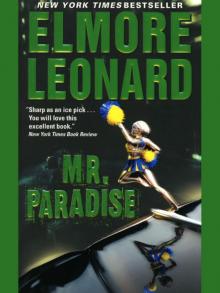 Mr. Paradise
Mr. Paradise The Hunted
The Hunted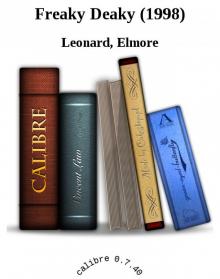 Freaky Deaky
Freaky Deaky Louly and Pretty Boy (Ss)
Louly and Pretty Boy (Ss)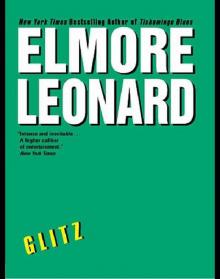 Glitz
Glitz A Coyote's in the House
A Coyote's in the House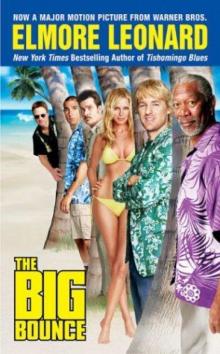 The Big Bounce jr-1
The Big Bounce jr-1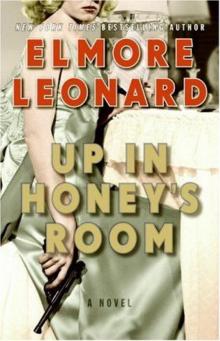 Up in Honey's Room cw-2
Up in Honey's Room cw-2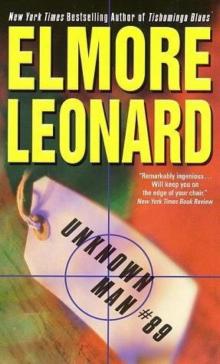 Unknown Man #89 jr-3
Unknown Man #89 jr-3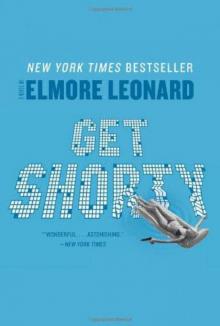 Get Shorty: A Novel cp-1
Get Shorty: A Novel cp-1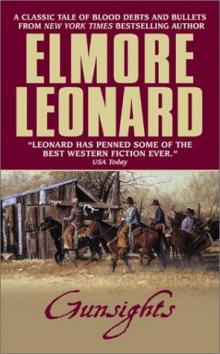 Gunsights
Gunsights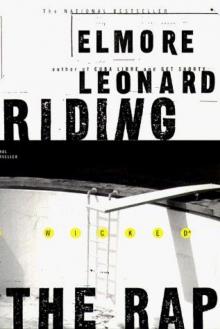 Riding the Rap rg-2
Riding the Rap rg-2